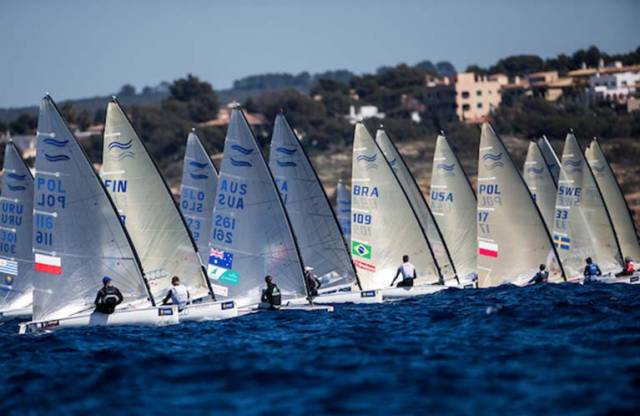Four of five of Ireland's full–time 49er Olympic campaigns launch this morning at the showcase Trofeo Princesa Sofía Regatta in Palma, Mallorca.
Northern Ireland helmsman Ryan Seaton, tenth in Rio, won the class in Palma last year but sails this time with new crew Seafra Guilfoyle. The North–South duo will be looking for a repeat performance in their Goldfinger named boat to get their Tokyo 2020 campaign off to a perfect start.
Wet Dreams sailed by Mark Hassett and Oisin O'Driscoll from West Cork, Seán and Tadhg Donnelly from the National Yacht Club as well as Howth's Robert Dickson and Sean Waddilove (recovered from injury) are also in action, all setting out on the first stages of what they hope will be a successful journey to the 2020 Olympic regatta in Tokyo, Japan. But only one will qualify.
The Olympic sailing competition of the 48 Trofeo Princesa Sofia IBEROSTAR will see almost 700 boats and 900 sailors from 56 nations race across the ten Olympic classes in the bay of Palma, in Majorca, Spain, from Monday 27 March to Saturday 1 April.
The 49er sailors are joined in Palma by two Belfast single-handers. Former Topper World Champion Liam Glynn and Donaghdee's Oisin McClelland will race in the Laser and Finn classes respectively.
There is also Irish interest in the women's 49erfx where the Royal Irish Yacht Club's Saskia Tidey competes for Team GB with Charlotte Dobson.
Seaton's London and Rio partner, Matt McGovern, who is now teamed up with Strangford's Robbie Gilmore, is not travelling to Palma, concentrating instead on the Delta Lloyd regatta in Holland in May. From there McGovern and Gilmore head to Kiel Week in June. In July the 49er Europeans are also in Kiel. The final event of our European season will be the 49er Worlds in Porto in August.
In any event, there will be no shortage of competition in the 49er for the four Irish boats with Argentina’s young pairing of Yago and Klaus Lange finished seventh in Rio and were fifth in Miami at the Sailing World Cup also attending. Poland’s Lukasz Przybytek and Pawel Kolodzinski were eighth in Rio and seventh in the 49er Europeans last year in Barcelona. And the Spanish pair of Diego Botin and Lago Lopez Marra were third in Miami, third in the 2016 Europeans and third in Palma last year and ninth in the Olympic regatta in Rio. In Miami in January Brasilian legend five times Olympic medallist Robert Scheidt opened a new chapter in his storied career with 16th at his first regatta in the 49er class with crew Gabriel Borges. They will be looking to prove their progression here. GBR’s 2004 Olympic bronze medallist Simon Hiscocks races with young Daniel Budden. Compatriots Dylan Fletcher and Alan Sign, sixth in Rio, start here after winning Miami.
There are changes to the format of the race in Palma. For example the 49er and 49er FX Classes will now be decided over three ten minute races over an Arena Style rectangle course.
The 49er fleet race in two groups Monday and Tuesday and then Wednesday and Friday are Semi Finals for 25 boats. From these aggregate scores there are ten boats advancing to a three race Medal Race Final.
Ferran Muniesa Manager of the Trofeo Princesa Sofía explains:
“ It was immediately obvious from last November’s World Sailing General Meeting that Olympic sailing needs changes to the format which was used in Rio 2016, as pushed for by the International Olympic Committee, by the Olympic classes and by the sailors themselves, recognising that Final day needs to be more understandable. At the last Olympics there were several cases where medals were already won before the Medal Race and that does not make sense to those who maybe do not know sailing, nor does it make for an exciting finale.
So we agreed with the Events Committee to get in touch with all of the different classes and to look at their proposals. Thus all off these formats come from the classes themselves. There is no point in experimenting without the backing of the classes. Now we hope we have formats which are more understandable to non experts.”
He adds:
“ We are a regatta which likes to innovate and to rise to a challenge like this. We have had a lot to adapt, not least the result systems. In practical terms that also means another course area on the last day and more people to run it. It’s a great challenge for the Trofeo Princesa Sofía IBEROSTAR. At first when we went through the proposals our people were looking at me like ‘what on earth?’…Now here we are ready to do it all. This is the right time to do it. We can be a little more flexible at this time in the quadrennial but you have to test it on a big scale like this, at a good level.

























































